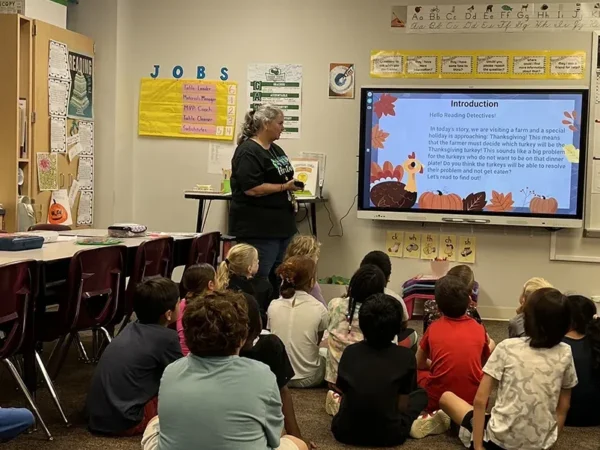Testing Technology’s Impact On Literacy And Writing
Many studies are available highlighting the impact of technology on both literacy and writing, but there is a lack of research combining the two areas. That’s where the Ready, Set, Write! program seeks to make an impact.
Ready, Set, Write! is the brainchild of Drs. Li-Jen Kuo and Quentin Dixon, associate professors in the Department of Teaching, Learning and Culture at Texas A&M University. They worked with doctoral student Stephanie Moody to develop curriculum that focuses on improving writing skills of struggling second grade students.
“We looked at the second grade TEKS set by the state of Texas for writing. We focused on targeting each of the skills the students should be learning throughout the year,” Moody explained.
Pre-service teachers from the College of Education and Human Development spend 10 weeks in three Bryan ISD elementary schools – Fannin, Henderson and Bonham Elementary. Over the course of 90 minutes, twice each week, the students go through three centers focused on different tools aimed at improving literacy and writing skills for struggling writers.
The first is spelling and grammar. Through traditional methods like dry erase boards or pencil and paper, students work on lower-level writing processes. They are taught skills such as changing the meaning of a word by adding ed/ing endings.
The second focuses on vocabulary skills. The students are taught words that can be used in writing, such as emotion words. The goal is to get the students thinking about more complex words than those such as happy or sad.
The final center is the technology practice center. Students are taught how to use certain apps related to various writing development tasks and other voice-to-text features.
“One of goals is to use technology in a way that paper and pencil can’t be used,” explained Moody. “It’s not about just typing on a document for the sake of typing, but doing things like recording a story before writing to see if the student’s ideas develop more thoroughly when they’re able to hear themselves speaking and then writing it.”
The day ends with a mini lesson on the writing process including brainstorming, organizing and editing before the students have a chance to work on their final project. By the end of the 10-week program, the students will have created two digital books featuring stories from each student in the class.
UNDERGRADUATE IMPACT
While the program is beneficial to students, Moody also points to the importance of the program for pre-service teachers. Unlike a traditional clinical teaching experience where pre-service teachers are working in someone else’s classroom, these undergraduates are running their own centers and developing their own ideas for skill enhancement.
“Our program is quite unique, not just because we are focusing on an understudied area of literature and helping struggling young writers, but because it is providing undergraduate education majors with an incredible opportunity to run their own classrooms before graduation.”
Layne Poole, a senior B.S. in Education major, joined the program last fall. She says her biggest takeaway is classroom management skills and strategies learned in the classroom.
“I can confidently say that after this year in Ready, Set, Write!, I could walk into my classroom tomorrow and not be worried. Classroom management is the number one fear of first-year teachers. I have already taught and implemented rules and procedures to a class of students, so I have already overcome the biggest hurdle before I even graduate,” she explained.
For Megan Heatherly, a senior B.S. in Education major, seeing her students improve has helped boost her confidence.
“Students are writing better developed stories and improving their grammar. Many of our students are English language learners and I have loved watching them improve in their English proficiency and vocabulary through writing and weekly interaction,” she explained. “This has taught me the importance of student interaction when teaching writing and using multiple modalities to teach ELL students.”
This is the final year of funding for Ready, Set, Write!. While no data has been analyzed, Moody has received positive feedback from principals at all three elementary schools. Should the program be funded again, Moody hopes it can be expanded to include more schools, students and pre-service teachers.
About the Writer
Ashley is the Media Relations Coordinator and responsible for news coverage in the Department of Teaching, Learning and Culture as well as the Department of Educational Psychology.
Articles by AshleyFor media inquiries, contact Ashley Green.
Fundraising
To learn more about how you can assist in fundraising, contact Amy Hurley, Director of Development ahurley@txamfoundation.com or 979-847-9455














